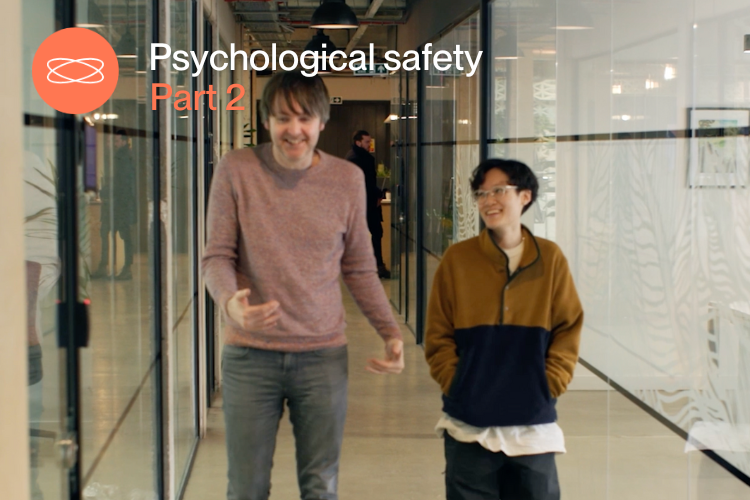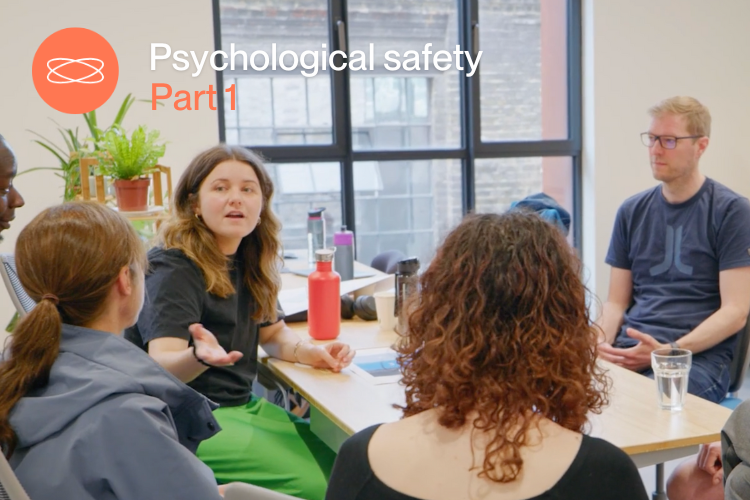
Fearless teams: why psychologically safe teams deliver innovative work
Norman Kerth
As one of the three Transformation Leads at Caution Your Blast Ltd (CYB), it’s my job to guide multidisciplinary teams to transform digital services.
Earlier today I was asked what I am doing to ensure my teams are psychologically safe? I was so pleased someone had asked.
My colleague Katie blogged last week about the importance of psychological safety, particularly in respect to person-centred research methods. At CYB, we also consider how to encourage psychological safety at a team level. In this post, I will talk about how leaders might form psychologically safe teams from the get-go, so that team feels supported and are in good shape to deliver innovation for clients.
What is psychological safety?
First, an introduction. Psychological safety is a term first coined in 1954 by the psychotherapist Carl Rogers, who is revered for developing person-centred therapy - a humanistic approach that helps people reach their full and unique potential. He argued that creativity and innovation occurs when an individual feels psychologically safe - where they are “without judgement, criticism, or evaluation”.
More recently Amy Edmondson, a business academic from Harvard Business School, progressed the concept to consider ‘team performance’. In her TED talk she refers to psychological safety as “a shared belief by members of a team that the team is safe for interpersonal risk taking”. In turn, as she noted in her 1999 study, this allows team members to speak out and challenge orthodoxy, allowing for learning and change.
It has become an important pillar for organisations who want to build productive teams. In 2015, Google listed 5 keys to a successful Google team (see Figure 1). The first and most important being psychological safety - the feeling that members can take risks without feeling insecure or embarrassed. This is echoed by State of Devops Reports (2019, 2021) that find psychological safety is an essential and foundational factor in software delivery.

Fig 1: The 5 keys to successful Google team (Google reWork)
Creating psychological safety
Clearly building psychological safety is not just the right thing to do for the people you work with, it is the right thing to do to achieve successful teams. So how might you create a psychologically safe team?
Using the Team Canvas
At CYB, we adopt multiple techniques throughout the life of a project to encourage a psychologically safe culture, but the approach we use to kick-off every team and every project is the Team Canvas. Developed by Alex Ivanov and Mirza Voloshchuk, the Team Canvas (see Figure 2) was created to enhance team culture by surfacing those things teams don’t talk about much, but really should because they often matter the most, such as:
preferred ways of working
personal strengths and weakness
individual motivation
I find that completing the canvas as a team on day #1 sets the tone from the outset.

Fig 2: The Team Canvas (Ivanov & Voloshchuk)
Framing work as a learning problem and combatting fear of failure
All teams consider ‘work goals’ - by that I mean discussions over client objectives, intended outcomes, and agreed deliverables. The team canvas expands the concept of work goals and encourages us to adopt a person-centred interpretation. The canvas asks colleagues to openly discuss their own motivations in relation to the work - what they hope to individually gain from time on the project. Personal work goals might be strengthening discipline knowledge, sharpening ‘soft’ skills, or maybe just having a cool topic to blog about. Whatever the objective, open discussion of personal motivations highlights our individual paths and story, building empathy and understanding for each person on the team. Also, from the outset, we set a learning culture. We are framing project delivery as an opportunity for self-learning and personal development, rather than merely a delivery problem.
Framing work as a learning opportunity is important as it allows us to reframe ‘failure’. Fear of failure is a key indicator of a team with low levels of psychological safety. People become scared of speaking out for fear of looking daft or disappointing colleagues. How leaders present the role of failure is therefore essential to building a psychologically healthy team.
By framing work as a learning opportunity, failure becomes a source of valuable data. Failure helps the team to achieve success, and as such becomes something we can welcome rather than fear. Some failures are genuinely good outcomes and take us on an innovative new path, and in truth some are not. Either way, our primary goal is to learn from failure.
Acknowledging fallibility
A further feature of the canvas I greatly value is that it encourages a culture where colleagues can be their authentic selves. This leads to humility, and recognition that we are all vulnerable, imperfect human beings doing the best we can. Research by Mike Robbins, author or ‘Bring Your Whole Self to Work’ (2018), suggests that when people are authentic, not only do they achieve greater success and personal fulfilment - they have the greatest impact on those around them, delivering innovative work together.
Asking us to share our individual strengths and weaknesses with the team, the canvas builds interpersonal trust, which we gain through the experience of sharing vulnerabilities. In turn, this encourages a humble mindset, helping us all to see that no matter how great our strengths, we can never have all the answers, and we are unable to predict the future. All of us, and team leaders in particular, need the skills and expertise of the people around them. The overriding benefit in multi-disciplinary teams is the choir of multidisciplinary voices. A high performing team will encourage all voices to sing together. I find that explicit, open discussion of individual strengths and weaknesses, and the risks that this brings to the project, gives the team courage to speak up, ask for help, and connect with others to achieve success.
Adding to the canvas
I have added a section to the standard canvas to provide further opportunity for the sharing of life stories. I now ask if people are happy to share with the team things that are going on in their lives - personal challenges that might be accommodated by the team, if only we knew. One colleague may have responsibility for the morning school run and prefer meetings to start after 9.30am. Another might have a health issue that impacts short-notice availability. Understanding and ultimately empathising with colleagues is the key here. Too often we hide what is happening in our lives for fear that we appear unprofessional, and I have seen teams become frustrated by behaviours that are not contextualised. Much better that we see our colleagues as fully rich human beings.
There is no single panacea for building a positive team culture. However, we find the Team Canvas to be a great tool for team initiation at the beginning of a project. From the get-go it sets the tone, framing failure as a learning opportunity, and an acceptance that we need everyone’s voice if the team is to be successful. Of course, such a framing only works if leaders continue to pay attention to the signals given off by the team. We can't simply "kick off" a project with a psychological safety perspective and expect it to continue unperturbed. By maintaining attentiveness to your team and continually nurturing a safe environment, you can help create a context that isn't just emotionally safe for your team, but also productive, innovative, and impactful.
